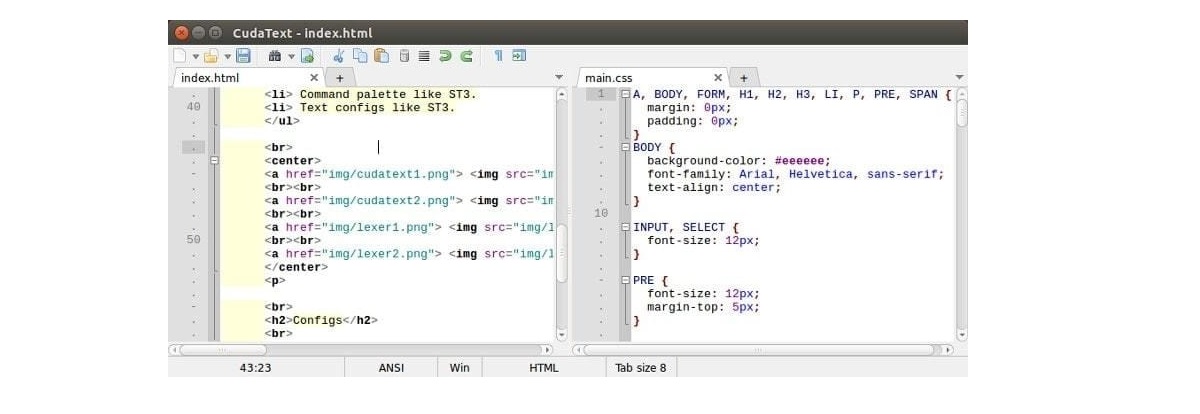
The new version of the free multiplatform code editor has been published CudaText 1.122.5 and this new version se have made various changes and improvements to the editor, highlighting the optimizations made for the editor to perform better.
For those who are unfamiliar with this code editor, you should know that supports Python extensions and has various features borrowed from Sublime TextIn addition to that there are some features of the integrated development environment implemented as plug-ins. More than 200 syntactic lexers have been prepared for programmers.
Main new features of CudaText 1.122.5
Over the 2 months since the previous announcement, some pretty cool enhancements have been implemented such as the optimization done so that this new edition works much faster, but this at the cost of losing information that is stored in "undo".
Another novelty that is presented is that added several minor commands to the command palettesuch as "remove all words under caret" and "clear search dialog history."
In addition to the dialog Buscar / Replace has been greatly redesigned at the request of GitHub users, as the word button names have been shortened to «| <«,« <«,«> ».
And also several buttons have been moved to a new submenu, which is called with the «…» button. The call of other useful commands from the dialog has been added to the same submenu. This allowed more space for the input fields.
Another request that was taken into account was that of a Windows XP user who asked for Python 3.4, which still worked on this operating system.
In the dialog box Find / Replace a new "Hello" button option was addedie "Highlight all occurrences", which behaves very similar to the same option in the Sublime Text search dialog.
Of the other changes that stand out from the new version:
- Automatic creation of fold ranges has been added to the parser for more than 4 consecutive comments (optional).
- Almost all out of the box plugins now support localization. This is necessary because many plug-ins create dialog boxes (a feature of CudaText).
- Cells in the status bar are highlighted on hover.
- CudaText also works when started via a symbolic link (Unix).
Some lexers have been improved (C, C ++, Python, CSS, Bash).
Python 3.9 is supported (on Windows, this requires a package).
How to install CudaText on Ubuntu and derivatives?
Finally, for those who are interested in being able to install this code editor on their system, they can do it in two different ways.
The first one is simply downloading the application's deb package and performing the installation of this with your favorite package manager or from the terminal.
The second method is downloaded the binary package from the editor, which from a personal point of view is more complete and it is not because there is a difference from the editor of the binary format to the precompiled one for Ubuntu or derivatives.
If not, additionally with the binary some files are included, which are tutorials to learn how to use the editor.
Moving on to the first method, what we are going to do is head to the following link where we can get the deb package.
Once the download is done, we can carry out the installation with a package manager or from the terminal by positioning ourselves in the folder where the download was made and typing the following command:
sudo apt install ./cudatext*.deb
While for the binary simply let's download the package "CudaText linux x64 qt5" or "CudaText linux x64" which the latter is in gtk.
To unzip the file we must do it with the command:
tar -Jxvf archivo.tar.xz
And inside the folder is the binary which we can execute by double clicking on it.
To download the package for another operating system, you can do it from the link below.